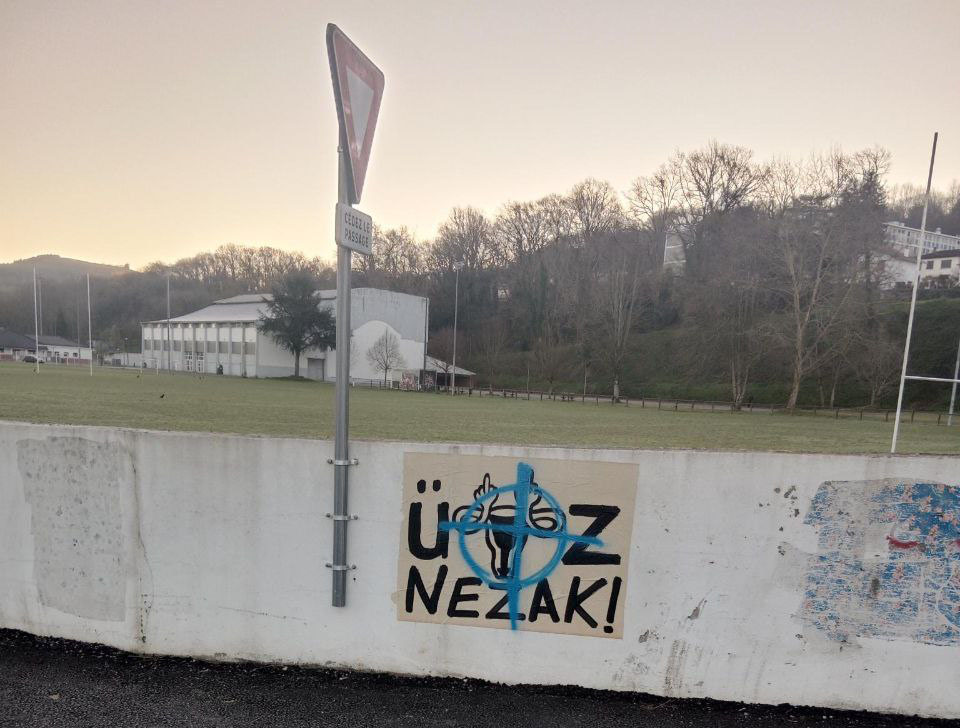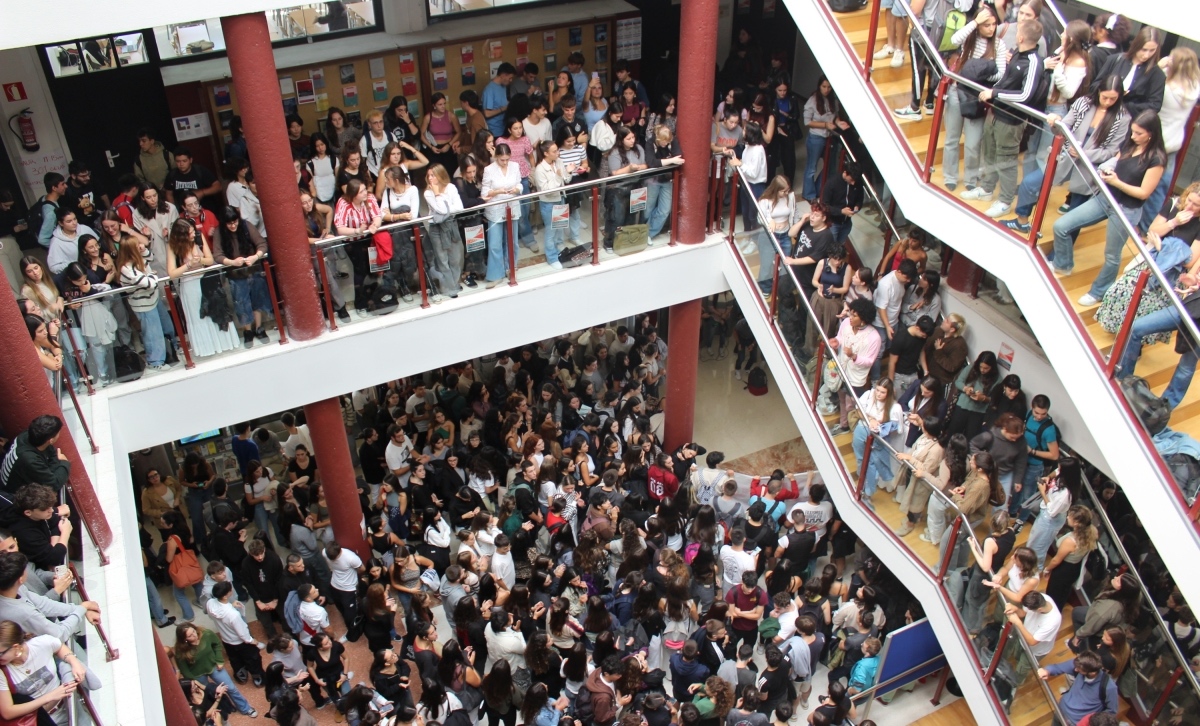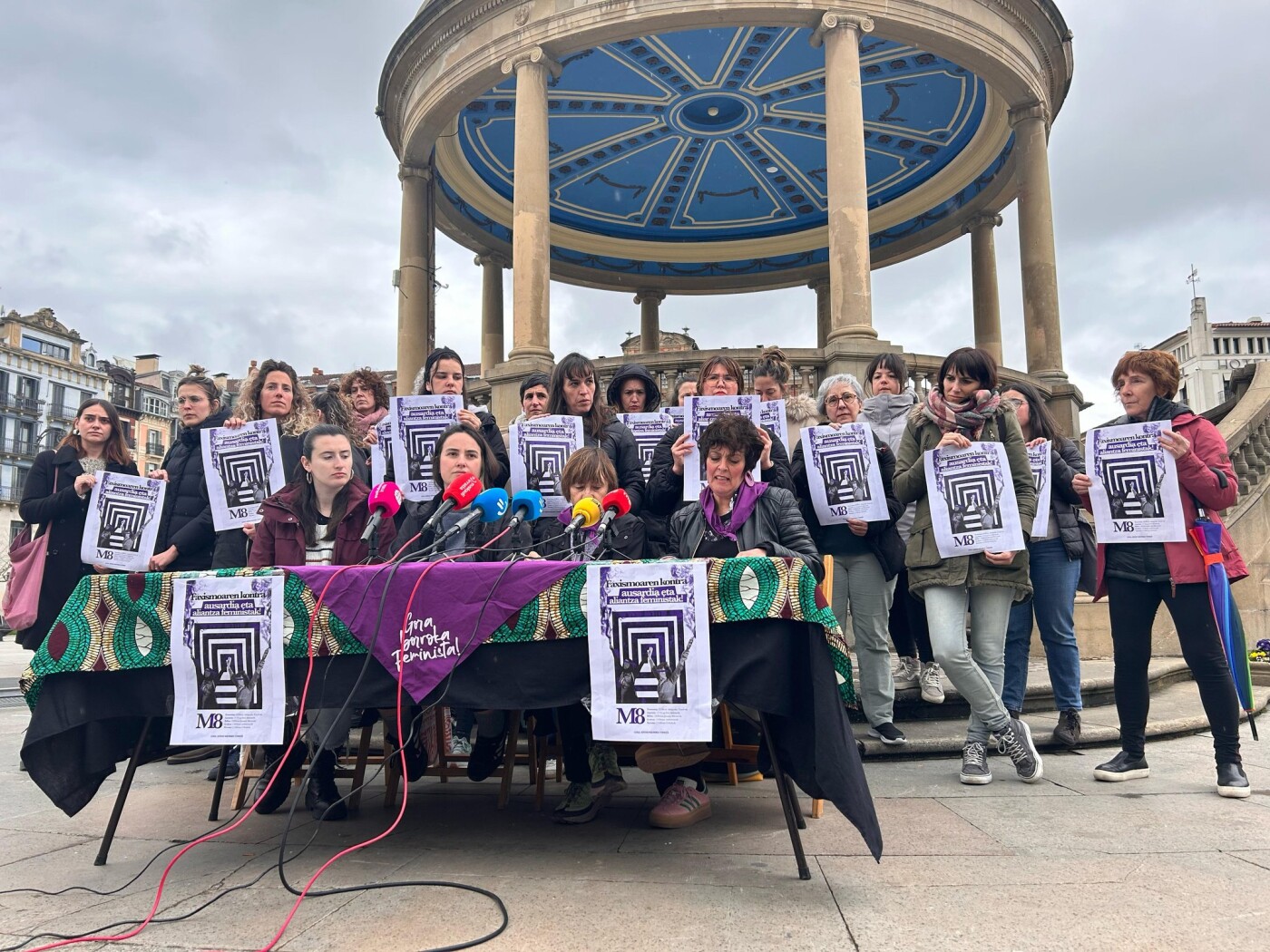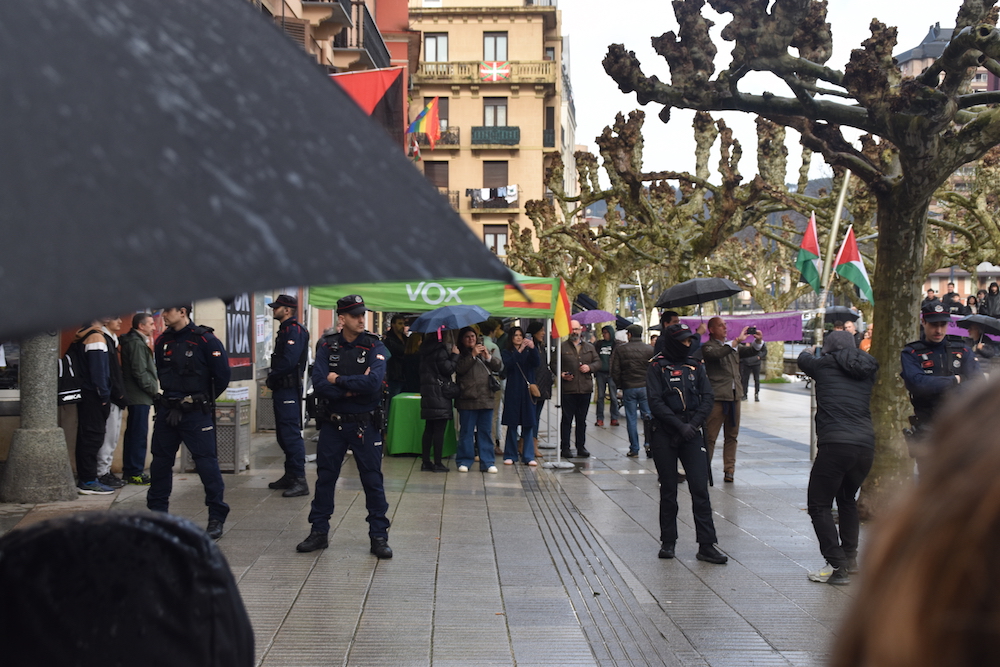The most touristic villages in Catalonia, meeting point of the votes of the extreme right
- On the basis of the results of the last Catalan and European elections, we will analyse how the vote of the extreme right has risen in the Catalan countries experiencing the greatest tourist pressure.
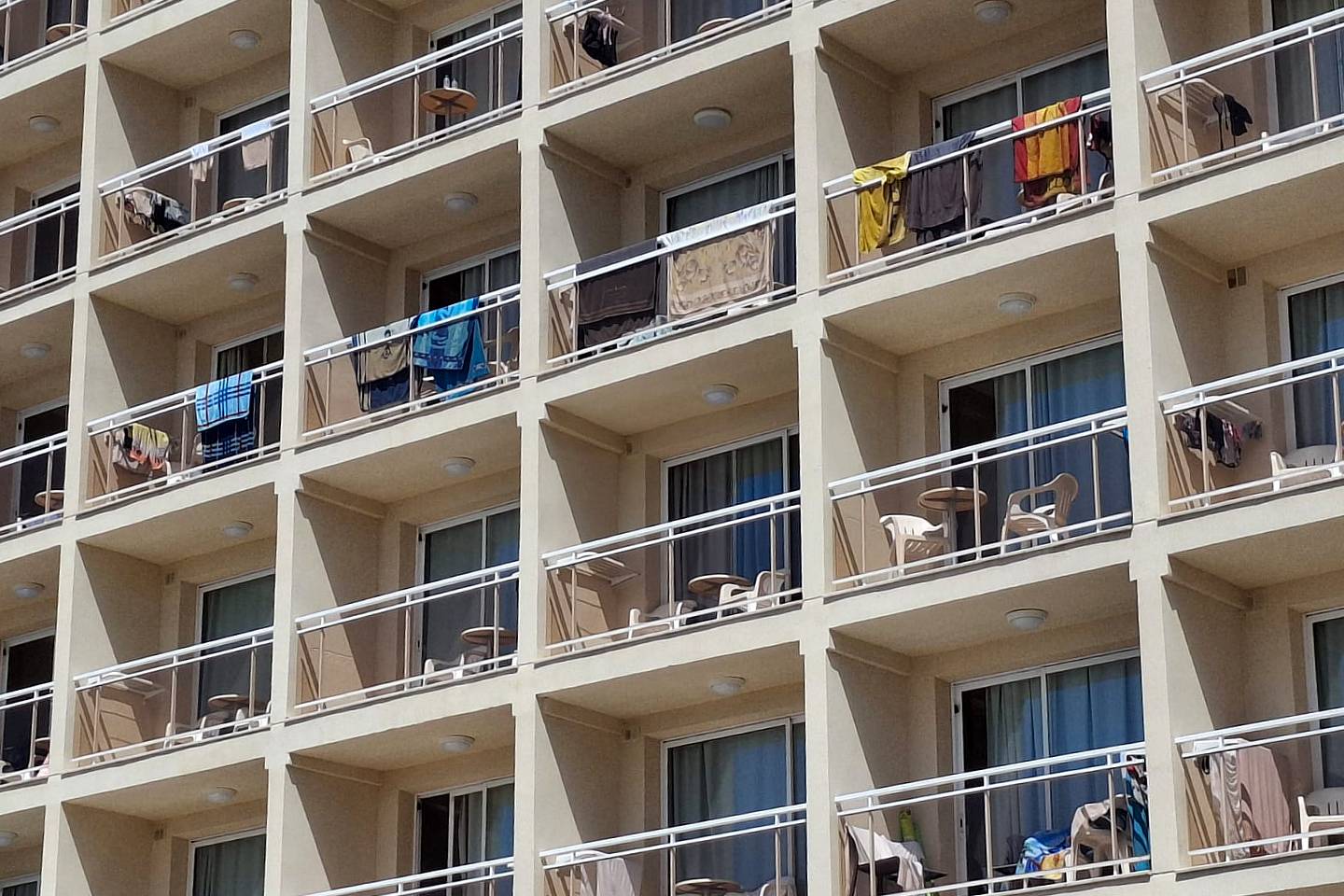
Rich neighborhoods and slums. When we talk about far-right voters, we mean places with the highest incomes and places with the highest poverty rates. It is true that the far-right ideas of parties such as Vox, Se Acabó la Fiesta (SALF) or Alianza Catalana have had more segidism in these two types of places. Thus, for example, the constitution of Santiago Abascal has caused revolts in places as diverse as the Cerro Park area, the Sant Gervasi-Galvany district of Barcelona or the metropolitan cities of Sant Adrià de Besòs or Badia del Vallès. In the first area the apartments exceed 200 square meters of average and the gross income per capita is between 34,000 and 39,000 euros, while in the second area the gross income per inhabitant is among the lowest in Catalonia and does not exceed 15,000 euros, being the apartments of an average of 50 square meters.
However, there are other enclaves that do not focus and that are the loudspeaker of the far right: tourist municipalities. The direct one analyzed the vote of the far-right in the last Catalan elections and found that in the areas with the greatest tourist pressure, the far-right parties of Vox and Alianza Catalana have achieved good results.
Salou (Tarragonès), for example, is the fifth tourist population of the State according to the tourism employers* Exceltur. In fact, it has 72,077 places of accommodation, a figure that in Catalonia is the only one that exceeds that of Barcelona, with 126,633. In addition, the National Statistical Institute (INE) estimates that there are over 37,000 tourists per square kilometer so far this year. In the locality, Vox obtained one of the best results in Catalonia and achieved almost 17% of the votes; in addition to those recorded by Alianza Catalana, one in five votes is for extreme right parties.
Something similar happens in another main tourist country: Roses (Alt Empordà) It is the seventh Catalan town in number of tourist accommodations, after Barcelona, Salou, Lloret, Cambrils, Torroella de Montgrí and Castell-Platja d 'Aro. Every year 301,000 tourists pass through an area where there are no more than 20,000 people registered. In the case of the town of Golf, 21.6% of the votes were by the far-right: 12.5% for Vox and 9.1% for Alianza Catalana.
These figures are similar in other municipalities and it seems that a connecting thread can be woven between the massification of tourism and the rise of the far right. However, some experts consulted have been cautious in establishing such a direct cause-effect relationship. The anthropologist and researcher at the University of Barcelona, Martin* Lundsteen, believes that "we need to broaden the focus to understand why this happens". In his view, the precariousness of the tourism sector lies behind the increase in the vote in favour of the extreme right. "These are municipalities that generate poorly paid and seasonal work, and that, in many cases, ended up being cared for by migrants", analyzes. It is in this area where the extreme right knows how to play better, and that is why it achieves good results in the most touristic municipalities.
Percentage of votes from the far right in the most touristic municipalities in the Catalan elections
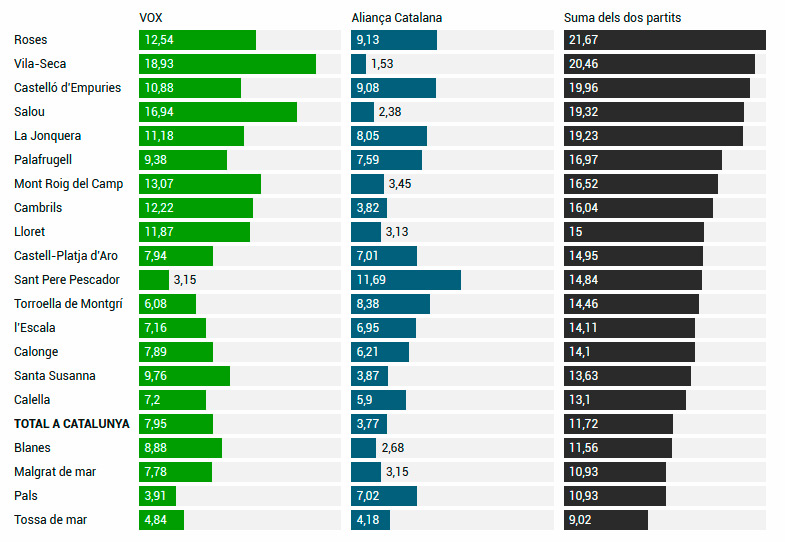
It is true that the figures confirm Lundsteen's thesis, since the most touristic municipalities in Catalonia are those with the lowest gross family income per inhabitant of the whole country. Of the 20 municipalities studied, only Santa Susanna (Maresme) and Pals (Baix Empordà) exceed EUR 16,000 per year, and in some cases, such as Roses, Lloret de Mar (La selva) or Castelló d'Empúries (Alt Empordà) exceed EUR 12,000, although the Catalan average is EUR 18,000.
At the same time, these places are a pole of attraction for migrants seeking employment, which in some cases makes the percentage of foreigners here one of the highest in the Catalan territory. "We're talking about countries where there's a lot of social inequality and people who are afraid of the foreign collective, because the extreme right uses it politically," says the anthropologist. In this sense, in Lloret almost four people were not born in Catalonia, in Salou they are 33% and in Castelló d'Empúries 45%.
However, Lundsteen has warned that this scheme is not exclusive to the tourism sector, but occurs in other municipalities far from the coast, where scenes have been recorded. "This is the case of the meat industry, which is a low-wage sector," the expert says. For example, it mentions villages such as Vic or Manlleu (Osona), where this industrial area has significant weight. "It is a sector with a lot of precariousness and seasonality that attracts migrant workers on the one hand and, on the other, increases the vote of the extreme right," he explained in a statement.
In other words, the mass tourism and the injustices caused directly by tourism in the local population are not, for the time being, issues related to the media agenda of the extreme right. Moreover, Vox, as demonstrated during the pandemic, has always been in favour of tourism entrepreneurs and in 2022 called for the return of tourists to Catalonia, in the same amount as they did before the health crisis. "Growing insecurity, feudal tourism and fiscal and regulatory burdens are underestimating the arrival of tourists to our territory," said a party member, who assured that Turkey would lower the figure.
At the same time, Alianza Catalana, when she talks about tourism in her program, has more profound than the arguments of the Catalan employers of the sector. It calls, among other measures, for the seasonality of tourism, for the promotion of major events or for the enhancement of "quality tourism". However, the training led by Sílvia Orriols has already warned that the tourist argument can go further, to blame the migration problems that arise in municipalities such as Salou or Lloret. In this regard, his programme states: "As a result of covid-19, the tourism sector has lost a lot of skilled labour. It was the last sector to recover normality, which remained closed for the most time. Therefore, very useful professionals left the sector and addressed others who were already working normally. The work was more stable, better paid and better off. This lack of qualified professionals was replaced by immigrants without experience but accepting poorer working and salary conditions. That has caused the excellence of the sector to be lost, because there is no professionalism and the service in Catalan almost does not exist”, he added.
Less clear trend
Although it is true that in the Catalan elections the voting of the tourist municipalities on the far right was very high, we cannot say the same in the European elections. For a start, Alianza Catalana was not present in Catalonia, and the far-right Spanish list has difficulties to enter into northern populations, which have a more Catalan identity. However, Vox was consolidated in the southern regions.
As for the rest of the Catalan countries, the behaviour of the extreme right in the European elections is ambiguous. In the islands, those of the 20 most touristic municipalities, the percentage of ultra-right voters was lower than that of the islands as a whole and of the rest of Spain.
In the Valencian Community, the percentage of votes cast to the extreme right in the tourist municipalities was higher than in the rest of the State. However, in these tourist municipalities the number of votes is similar to that recorded in the Valencian country as a whole.
In fact, according to Alexis Lara Climent, sociologist of the Scientific District, if we look at the most touristic municipalities, the far right gets more votes in the counties of southern Valencia, "because historically there is a more Spanish, more provincial and less Valencian identity". Also, the Basque sociologist and political scientist Xavier Peiro is reluctant to establish a clear relationship between tourism and the extreme right in the Basque Country. "These are not conclusive data," he said, adding that in the tourist municipalities of the city of Valencia the resistance to the extreme right continues to grow.
In any case, the two experts have pointed out that these are very precarious spaces. "Inequality is higher in the tourist areas and this generates discomfort due to the lack of work alternatives and the price of housing and renting," says Lara. According to INE data, most Valencian tourist municipalities do not exceed EUR 12,000 per year, while for all the cities and towns of the territory the figure exceeds EUR 22,000. "It is possible that this discomfort is exploited by the extreme right, which does not consider the system responsible, and it is always more difficult to see it and reproach it to those below, against the war of the last penultimate," says the member of the Scientific Region.
Beyond that, in the European elections, The Festival Ended did have a greater impact on the more touristic municipalities. We can draw a line in the geography of Alvise Pérez's vote by networks, from Cadiz to Alicante, which travels along the coast. Together with the Canary Islands, they are the places where the ultraderechyes have received the most support. In the whole of Catalonia, the SALF failed and only in the tourist areas of Tarragona, with the authorization of the metropolitan area of Barcelona, obtained results similar to the rest of the Spanish State. It seems, therefore, that this new extreme right is being incorporated into these kinds of municipalities.
Percentage of votes of the extreme right in the most touristic municipalities of Catalonia in the European elections
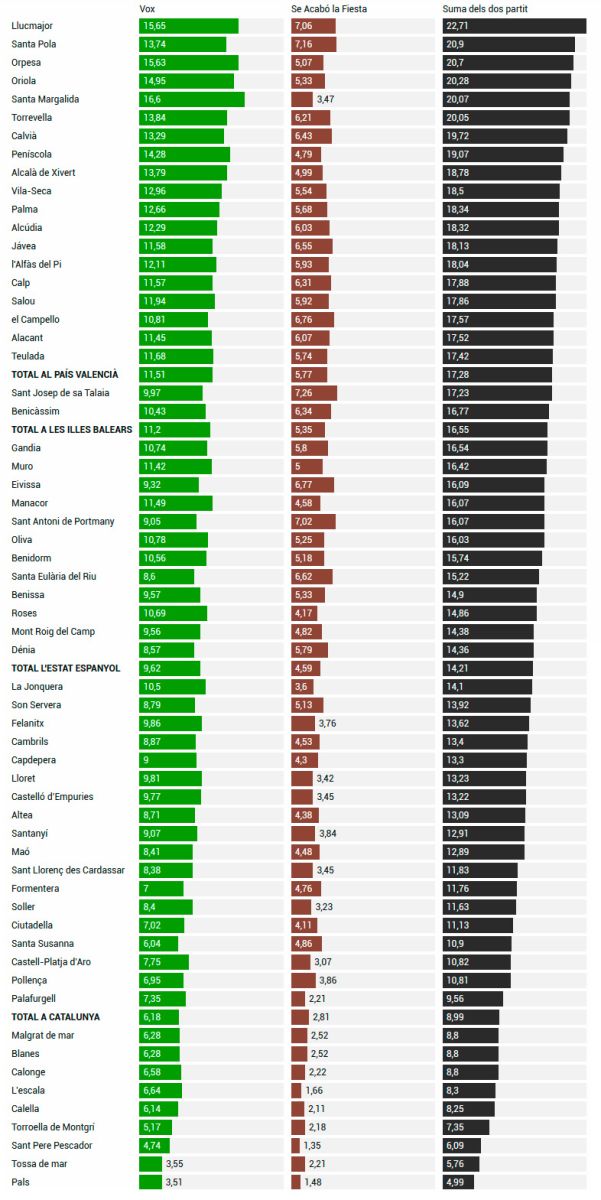
Euskal Herriko Mugimendu Feministak aurtengo Martxoak 8ko mobilizazioak "faxismoaren, erreakzionarismoaren eta zapalkuntzaren aurkako aliantzak" ehuntzean ardaztu ditu.
Kepa Kortak Naiz-en idatzitako “Musikariaren jakituria” artikuluan faxismoa definitzeko... [+]
Errumaniako presidentetzarako kandidatu ohia Călin Georgescu, aurten berriro iragan behar diren hauteskundeetara erregistratzera zihoalarik, Poliziak atxilotu zuen otsailaren 26an. Egozten dizkioten krimenetarik bat “ordenu konstituzionalaren aurkako ekimenen... [+]
Martxoak 8an egindako pintaketak gainetik margotu dituzte ikur faxistekin Zuberoako hiriburuan. Horren aurrean elkarretaratzera deitu dute, astelehenean.
Behe bandako zutabea bezain erlojuaren aurka prestatzen ditut mozorroak, korrika, aztoratuta, zalantzaz, erretxin, estropezuka eta sarri arrakasta ez erabatekoarekin; adibidez, zutabe hau eta biharko mozorroa. Oraindik ez dakit bietako zein bukatuko dudan lehenago. Baina... [+]
Martxoaren 8a Getxo bere bizitokian igaro du: kumbia dekolonial eta antiarrazista topaketa antolatu du Algortako Herriko Tabernan, Abianen, Hija del Nopal DJrekin batera.
Argentinatik Getxora migratu zen Celeste Agüero, kantutegi herrikoi batekin eta poesia xuxurlatzeko... [+]
Alemaniako Poliziak asteleheneko gertakariaren arrazoiak "politikoak" zirela baztertu duen arren, 35 urteko Alexander Scheuermann Ring Bund talde neonaziko kide zen. Bi hildako eta hamar zauritu utzi dituen atentatuaren egileak sare sozialetan "gorroto mezuak"... [+]
Leporaturikoa ez onarturik, eta sare sozialetako kontuak "lapurtu" zizkiotela erranik, salaketa jarri zuen Arabako campuseko Farmazia Fakultateko irakasleak. Gernikako auzitegiak ondorioztatu du ez dagoela modurik frogatzeko mezu horiek berak idatzitakoak diren ala ez.
Martxoak 8a heltzear da beste urtebetez, eta nahiz eta zenbaitek erabiltzen duten urtean behin beren irudia morez margotzeko soilik, feministek kaleak aldarriz betetzeko baliatzen dute egun seinalatu hau. 2020an, duela bost urte, milaka emakumek elkarrekin oihukatu zuten euren... [+]
Ikerketa bat egin dute Alemanian, hauteskundeen atarian: kontuak sortu dituzte TikToken, X-n eta Instagramen, eta aztertu egin dute algoritmoak zer nolako edukiak erakusten dituen. Guztietan, algoritmoak eskuinera eta eskuin muturrera jotzen du gehien, TikToken nabarmen.
Ekitaldian, Mileik motozerra bat oparitu dio Muski, murrizketa sozialen sinbolo eta aldarri gisa.
Sozialdemokratek inoizko emaitzarik kaskarrenak lortu dituzten arren, litekeena da demokristau kontserbadoreekin elkartzea eta gobernua osatzea. Botoen %28,5 jaso ditu CDUk, eskuin muturreko AfDk %20,7 eta SPDk %16,4.
LGTBIQ+ banderaren itzalpean eta mezu eta doinu antifaxistez inguratuta jarri du karpa Voxek.













